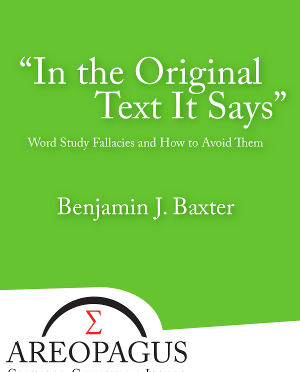8:14 AM In Greek 2 class this past week we talked about the Lord’s Supper because I had included the Greek adverb “worthily” (and its antonym) in our vocabulary for the day. (Isn’t it so unlike me to go on rabbit trials in class?) I stressed that there’s a world of difference between an adjective (“unworthy”) and an adverb (“unworthily”). You will recall that the Corinthian church was behaving rather badly when they came together to share the bread and the cup. Paul quotes Jesus’ own words after Jesus had broken the bread: “This is my body, which is for you. Do this in remembrance of Me.” Paul’s point is that we come to the table, not to remember our sins, but to remember our Savior. And yet how many of us can attest to being asked whether or not we are “worthy” to partake of the elements that day? We are requested to have a time of introspection to see whether or not we feel worthy enough to participate in the Lord’s Supper. Boy are we good at complicating the ways of Jesus. I have nothing at all against a time of introspection, or a time of confession, but that need not be left for the Lord’s Supper. In fact, Jesus never invited anyone to His table. His words are a command in the imperative mood: “Do this in remembrance of me.” As I said, we do not come to the table to remember our sins but our Savior. This focus, unfortunately, is often blurred. Remembrance is at the heart any true observance of the Lord’s Supper. Through the bread and the cup we participate in Christ. So the service is a communion as well as a commemoration. Our common participation in the meal is a sign of our fellowship and unity. Indeed, the earliest Christians took the bread and the cup as part of a communal meal. As I argued in my book Seven Marks of a New Testament Church, there is much to be gained by this practice. Fellowship is a vitally important aspect of the Lord’s Supper. Rather than the pulpit being the center of attention, the elements (Christ and His death!) are. As we partake with others, we are united with Christ as one body. That’s why there is only one table of the Lord. There’s not one table for the rich and another for the poor; one for slaves and another for the free; one for Jewish Christians and another for Gentile Christians; one for the educated and another for the uneducated; one for men and another for women; one for Calvinists and another for Arminians; one for clergy and another for laity; one for homeschool families and another for families whose children attend public school. The entire focus is on Christ, on whom we feast together. That’s why I called my chapter on the Lord’s Supper “Christ-Centered Gatherings.” It is Christ we celebrate! “This is our Servant-King-Savior. This is our Senior Pastor. And now He calls upon us to follow Him. Yes, we will follow You, King Jesus!” The closer our relationship with our Head, the better we will be able to spur one another on in the Christian life. We should go to every church gathering not just thinking, “What can I get out of it?” or even “What can I contribute to it?” but “How can I acknowledge what Jesus has done for me?” One way to do this is by lifting Him up and giving Him central place every single time we gather, as He commanded us to do. Jesus never commanded His followers to observe Christmas. He never told us to celebrate Easter. He said, “Keep on doing this in remembrance of Me.” Unless the entire church has been directed back in remembrance of the cross, no true Lord’s Supper has taken place.
For more, please read Howard Marshall’s classic essay Some Considerations Regarding the Lord’s Supper Today. I am fully convinced that God is big enough and good enough to lead us back into a biblical observation of His Supper.
(From Dave Black Online. Used by permission.)

 Parts of it are truly outstanding. The translators render “Thou are my Son; today have I begotten thee” as “You are my Son; today I have become your Father.” Great so far. And then there’s this footnote on v. 8: “or, God is your kingdom.” The text of the Good News Bible, of course, reads “Your kingdom, O God, will last forever and forever!” The confusion here stems from the Greek: Is theos nominative or vocative? The translators have taken it as a vocative (correctly, in my view), but at least they note the alternative. Good for them. But here’s what puzzles me. Notice that they begin a new paragraph in verse 4.
Parts of it are truly outstanding. The translators render “Thou are my Son; today have I begotten thee” as “You are my Son; today I have become your Father.” Great so far. And then there’s this footnote on v. 8: “or, God is your kingdom.” The text of the Good News Bible, of course, reads “Your kingdom, O God, will last forever and forever!” The confusion here stems from the Greek: Is theos nominative or vocative? The translators have taken it as a vocative (correctly, in my view), but at least they note the alternative. Good for them. But here’s what puzzles me. Notice that they begin a new paragraph in verse 4. This is impossible. It contradicts the Greek text. Verses 1-4 are all one long sentence in the original. Making a new paragraph in verse 4 is just not empirically possible. It’s completely illogical — like asserting “married bachelor.” This sort of inconsistency drives me nuts. (People sometimes tell me I’m too OCD about these kinds of things but it’s part of my temperament.) I really, truly, sincerely believe we can do better. And yet, these kinds of oversights are hardly exceptional. Am I hereby trying to make a case for the study of Greek? In one sense yes. But at least you can compare other English translations before arriving at your conclusion as to the paragraph structure of a New Testament book. Again, I deeply appreciate the translators who produced the Good News Bible. When I was a teenager I literally could not put this book down. The text was readable, and the line drawings were fantastic. But our focus should always be on faithfulness to the text as the Holy Spirit inspired it — and this includes matters of syntax and structure, not just words.
This is impossible. It contradicts the Greek text. Verses 1-4 are all one long sentence in the original. Making a new paragraph in verse 4 is just not empirically possible. It’s completely illogical — like asserting “married bachelor.” This sort of inconsistency drives me nuts. (People sometimes tell me I’m too OCD about these kinds of things but it’s part of my temperament.) I really, truly, sincerely believe we can do better. And yet, these kinds of oversights are hardly exceptional. Am I hereby trying to make a case for the study of Greek? In one sense yes. But at least you can compare other English translations before arriving at your conclusion as to the paragraph structure of a New Testament book. Again, I deeply appreciate the translators who produced the Good News Bible. When I was a teenager I literally could not put this book down. The text was readable, and the line drawings were fantastic. But our focus should always be on faithfulness to the text as the Holy Spirit inspired it — and this includes matters of syntax and structure, not just words.



